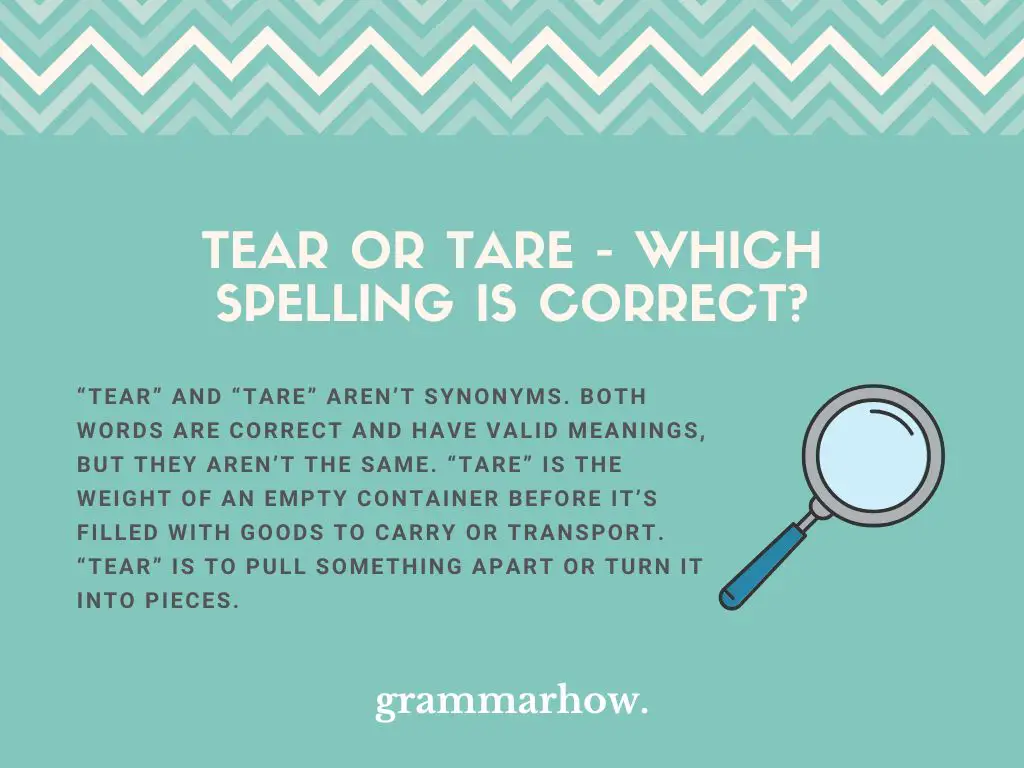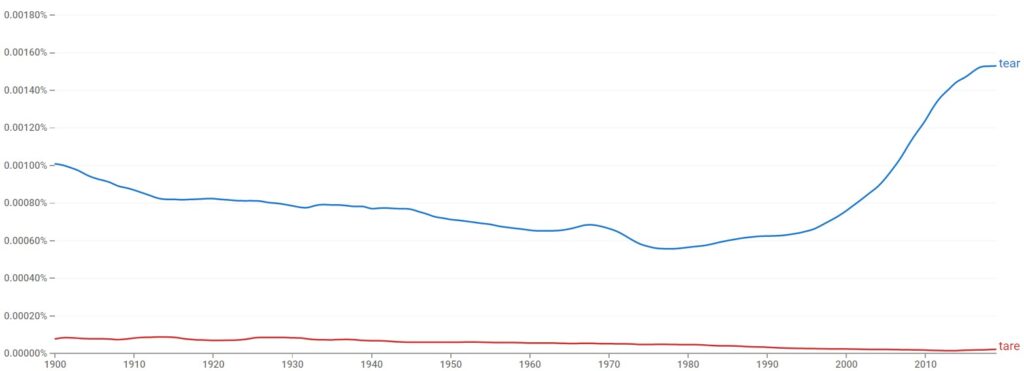What is the correct word to indicate that something was pulled into pieces? Should we say “Tear” or “Tare”?
Both words have a similar pronunciation. We want to know which one is correct and which we should avoid. We also want to know the correct meaning of them.
Tear or Tare – Which Spelling Is Correct?
“Tear” and “Tare” aren’t synonyms. Both words are correct and have valid meanings, but they aren’t the same. “Tare” is the weight of an empty container before it’s filled with goods to carry or transport. “Tear” is to pull something apart or turn it into pieces.

Take a look at some examples, below:
- Lisa told me to tear the paper.
- Lisa told me to tare the paper. (incorrect)
- We need to know the tare weight before filling the container.
- We need to know the tear weight before filling the container. (incorrect)
The examples show two scenarios. In the first one, “Tear” is the correct word because the intention is to destroy the paper.
In the second, “Tare” is the correct word, because we’re discussing the weight of an empty container.
Tear
“Tear” mostly means two things. On one hand, “Tear” is to pull something apart. On the other, it means a saline drop that comes out of the eye when an individual is crying. Considering the pronunciation, we’ll mostly compare “Tear”, as pulling apart, with “Tare”.
The Cambridge Dictionary expands the definition of “Tear” by saying, for example, it means “to pull pieces off of” something. It also says, “a hole in a piece of paper, cloth, or other material, where it has been torn”.
Take a look at some helpful examples below:
- Adam looked like he was about to tear up.
- It looks like someone tore the poster.
- Do you mind tearing some paper for me?
- I accidentally tore my shirt when it got stuck on the door handle.
- Some of the pages were torn out of the book, so I couldn’t finish it.
Tare
“Tare” isn’t a synonym for “Tear”. It has a completely separate meaning. “Tare” is the weight of a vehicle or container when empty before it’s filled with goods to carry or transport.
Take a look at The Cambridge Dictionary’s definition, which is very detailed, but helpful: “the weight of a vehicle or container when empty, taken away from the combined weight of the vehicle, etc. plus the goods it’s carrying to find the net weight of the goods”.
Let’s go over some helpful examples:
- Be careful not to tare any of the documents. (incorrect)
- Be careful not to tear any of the documents.
- The tare weight of the car was four thousand pounds.
- The document will show the tare weights in brackets.
- A tare function is usually included for weighing applications.
Sentences 1 and 2 show “Tare” being used in the place of “Tear” – which is incorrect and doesn’t work. “Tare” and “Tear” aren’t’ synonyms and in this context, the use of “Tare” should be avoided.
Sentences 3 to 5 show “Tare” being properly used as a measurement of weight for goods being transported.
Which Is Used the Most?
Although both words have different meanings, we want to know which one of them is used more often. Do you think it’s “Tear” or “Tare”? Let’s take a look at the graph from Google Ngram Viewer below.

“Tear” is the prevalent word, in this comparison. We think it was expected for a few reasons. “Tear” is a word with many meanings, used for different purposes. Consequently, it’ll appear more often in different scenarios.
“Tare”, even though it’s a correct word, is very technical and has strict use. Most people aren’t concerned about “Tare” weights as they go by their daily lives.
With that said, remember those two words are correct and acceptable. As long as you use them appropriately, according to their meaning, you’ll be fine.
Final Thoughts
“Tear” and “Tare” are both acceptable words, but they carry different meanings. “Tear” is to pull something apart. It is also the salty liquid that comes out of our eyes when we cry. “Tare” is the weight of a container when still empty, before being filled out with goods.

Martin holds a Master’s degree in Finance and International Business. He has six years of experience in professional communication with clients, executives, and colleagues. Furthermore, he has teaching experience from Aarhus University. Martin has been featured as an expert in communication and teaching on Forbes and Shopify. Read more about Martin here.
